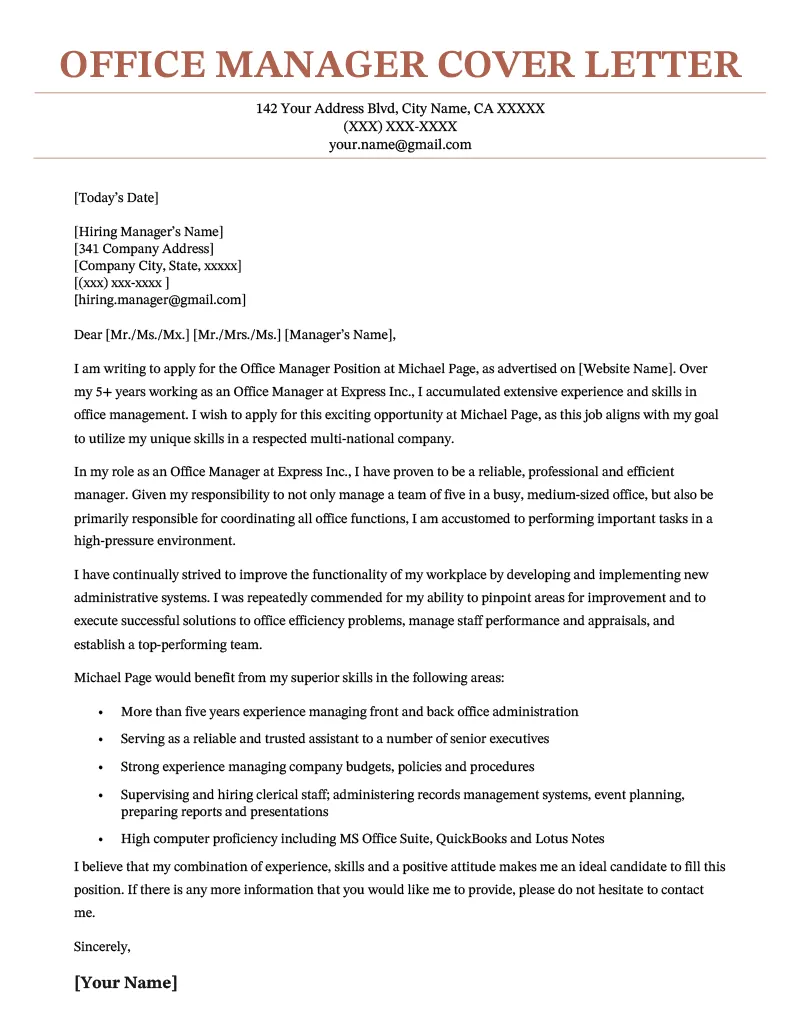Crafting a Compelling Office Management Cover Letter
In the competitive world of office management, a well-crafted cover letter can be the key to unlocking your dream job. It’s your first opportunity to make a strong impression, showcasing not only your skills and experience but also your personality and enthusiasm. This guide will provide you with the essential steps and insights needed to create a cover letter that stands out from the crowd and lands you an interview. Remember, your cover letter is a marketing tool, designed to highlight your unique value proposition and convince the hiring manager that you are the perfect fit for the role. Invest time in it; it’s worth the effort!
Understanding the Purpose of an Office Management Cover Letter
The primary purpose of an office management cover letter is to introduce yourself and your qualifications in a concise and compelling manner. It’s not simply a rehash of your resume; it’s an opportunity to elaborate on your most relevant skills and experiences, demonstrating how they align with the specific requirements of the job. The cover letter allows you to showcase your personality, communication style, and genuine interest in the company and the position. It’s a chance to tell a story, connecting your past experiences with the future you envision in this new role, which includes attention to detail and proficiency with different office management systems.
Highlighting Relevant Skills and Experience
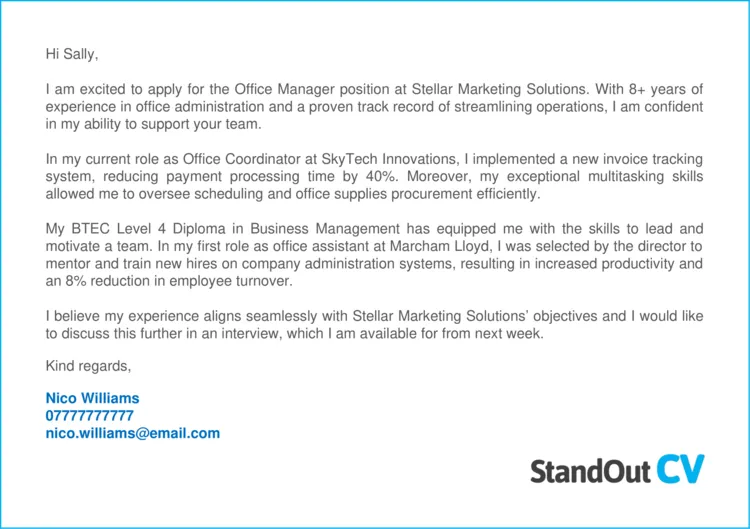
When writing your cover letter, the focus should be on demonstrating how your skills and experience align with the specific requirements of the office management role. The hiring manager will be looking for evidence that you possess the necessary abilities to excel in the position. This involves identifying the key skills mentioned in the job description and providing concrete examples of how you’ve utilized those skills in past roles. Use action verbs to describe your accomplishments, quantifying your achievements whenever possible, such as ‘Managed a team of five administrative assistants, resulting in a 15% increase in office efficiency.’ This helps to showcase your capabilities in a clear and persuasive manner.
Essential Skills to Showcase
Administrative and Organizational Skills
Office management revolves around administrative tasks and efficient organization. Your cover letter needs to demonstrate your proficiency in these areas. Highlight your ability to manage calendars, schedule meetings, handle correspondence, and maintain accurate records. Mention any experience with office supply management, vendor relations, and facility upkeep. Showcase your organizational prowess by describing how you’ve streamlined processes, improved filing systems, or implemented time-saving strategies. Providing examples of how you’ve improved office workflows or reduced administrative costs can be particularly compelling.
Communication and Interpersonal Skills
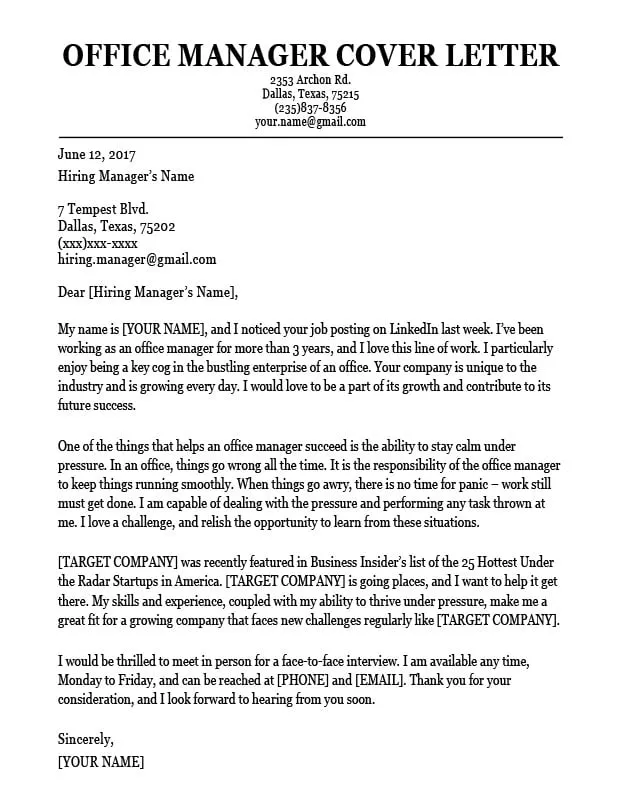
Strong communication and interpersonal skills are critical for office managers. Emphasize your ability to communicate effectively both verbally and in writing, and to interact professionally with colleagues, clients, and vendors. Provide examples of your conflict resolution skills, your ability to build rapport, and your experience in managing and motivating teams. Highlight any experience in customer service or handling sensitive information. These skills are essential for creating a positive and productive work environment and managing relationships effectively. A good office manager is often the first point of contact and the face of the company, so your ability to interact positively is crucial.
Technical Proficiency
Technical proficiency is increasingly important in office management. Showcase your skills with relevant software and technologies. This includes proficiency in Microsoft Office Suite (Word, Excel, PowerPoint, Outlook), as well as experience with any other specific software mentioned in the job description, such as project management tools, CRM software, or accounting programs. If you have experience with managing social media or website content, be sure to include that as well. Highlight any data entry experience or familiarity with digital file management systems. Being technically proficient is a vital skill that can increase your chances of landing the job.
Structuring Your Office Management Cover Letter
A well-structured cover letter is easy to read and conveys information efficiently. Adhere to a standard business letter format, ensuring a professional and polished appearance. Start with a clear and concise header containing your contact information, followed by the date and the hiring manager’s contact information. Then, address the letter to the appropriate person, if possible. Keep your paragraphs brief and to the point, using clear and concise language. Organize your content logically, using headings and subheadings to guide the reader and highlight key information. The format is as important as the content.
Header and Contact Information
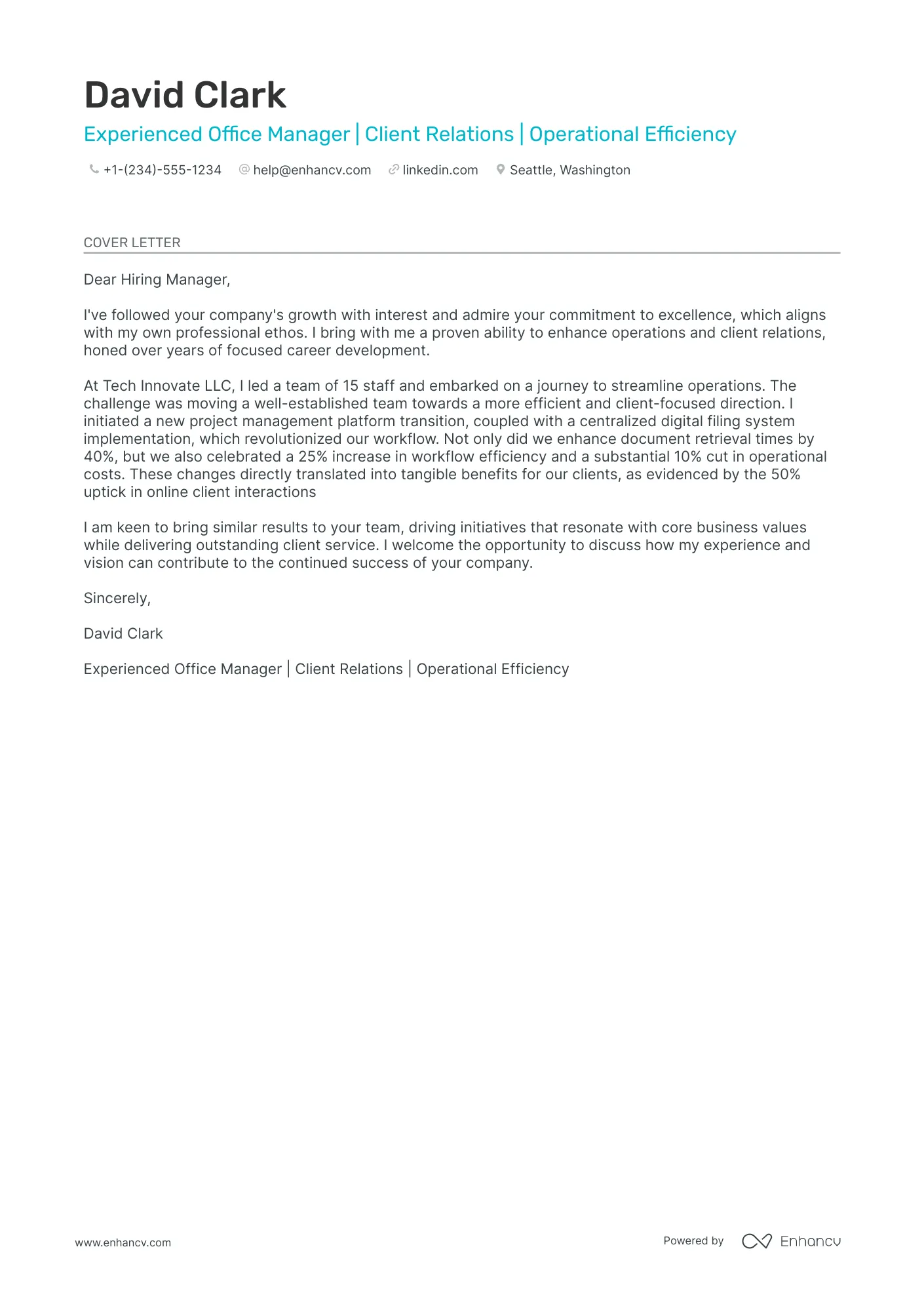
Begin your cover letter with your full name, address, phone number, and email address. Make sure your contact information is accurate and up-to-date. Include the date of the letter, followed by the hiring manager’s name (if known), title, and company address. Double-check all information for accuracy. This ensures the hiring manager can easily contact you if they decide to move forward with your application.
Greeting and Introduction
Start your cover letter with a professional greeting, such as “Dear Mr./Ms./Mx. [Last Name],” if you know the hiring manager’s name. If you don’t know the name, use “Dear Hiring Manager.” In your introduction, clearly state the position you are applying for and briefly mention where you found the job posting. Immediately capture the reader’s attention by highlighting your most relevant skills or experience. This is your chance to make a strong first impression and encourage the reader to continue reading your letter.
Body Paragraphs Highlighting Achievements
The body of your cover letter is where you elaborate on your skills and experience. Use a few well-structured paragraphs to highlight your most significant achievements and how they align with the job requirements. Provide specific examples of how you have excelled in previous roles, quantifying your accomplishments whenever possible. Focus on results, such as increased efficiency, cost savings, or improved employee satisfaction. Tailor your examples to the specific requirements of the job description, demonstrating that you have the skills and experience the company is seeking.
Tailoring Your Cover Letter to the Job Description
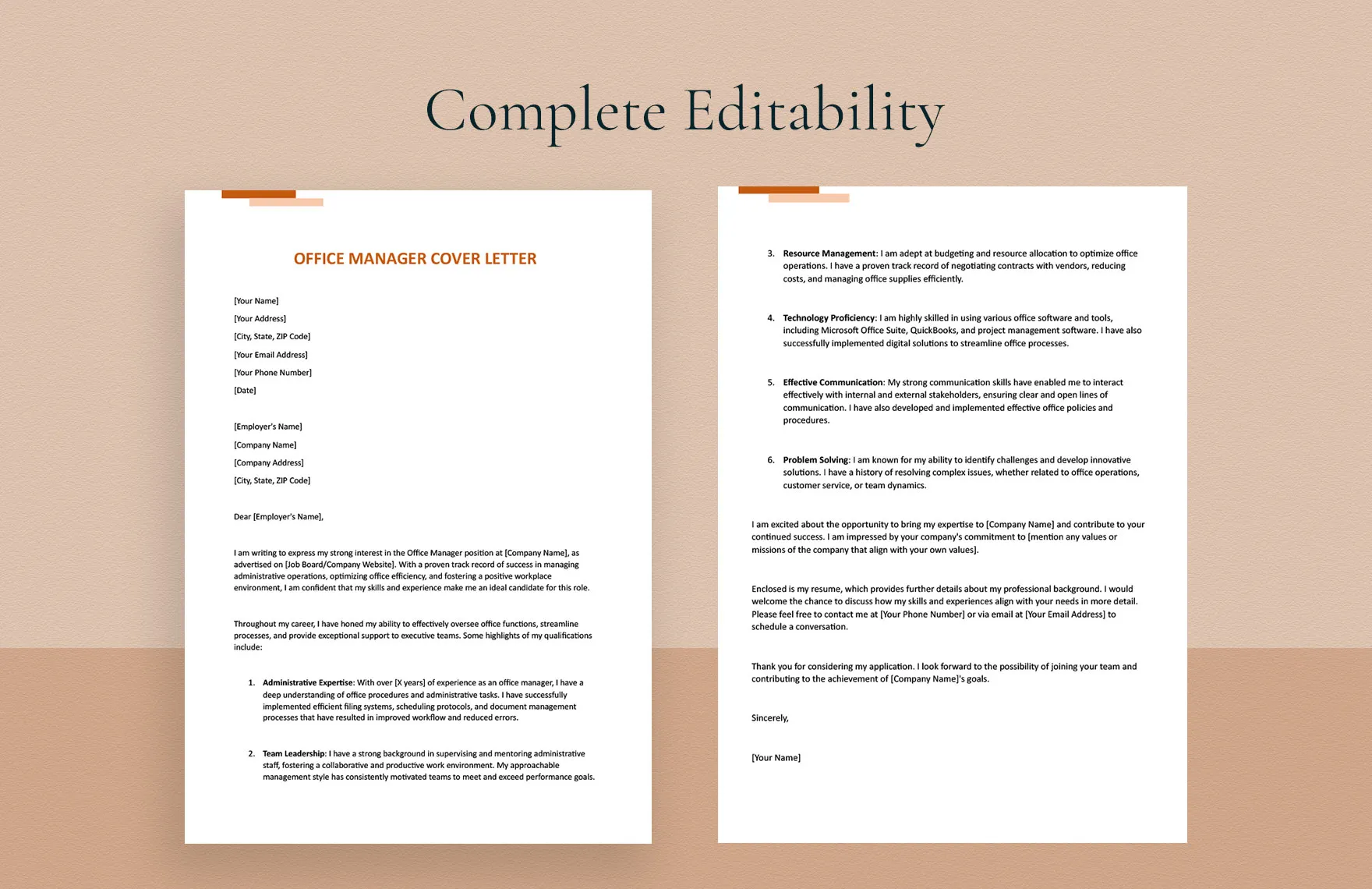
Personalizing your cover letter for each job application is crucial. Generic cover letters are easily spotted and often disregarded. Instead, carefully analyze the job description and identify the key requirements, skills, and qualifications the employer is seeking. Then, customize your cover letter to address these specific needs. Demonstrate your understanding of the company’s mission, values, and culture. Show that you’ve taken the time to research the organization and understand the role. This personalization shows your genuine interest and increases your chances of getting noticed.
Analyzing the Job Requirements
Before you start writing, carefully read the job description multiple times. Identify the essential and desired qualifications. Look for keywords and phrases that are frequently mentioned. Consider the company’s values and what they are looking for in a candidate. Make a list of the key requirements and use it as a guide when writing your cover letter. Understanding the job requirements ensures that you address the employer’s specific needs and tailor your application accordingly. Make a checklist if necessary.
Matching Your Skills to the Job Description
Once you’ve identified the job requirements, match your skills and experience to them. Review your resume and identify examples that demonstrate your abilities in those areas. In your cover letter, clearly state how your skills and experience align with the specific needs of the role. Use the same keywords and phrases from the job description to showcase your qualifications. Provide specific examples of your accomplishments, highlighting how you’ve successfully utilized your skills in past roles. This direct connection helps the hiring manager quickly see the value you bring.
Keywords to Include
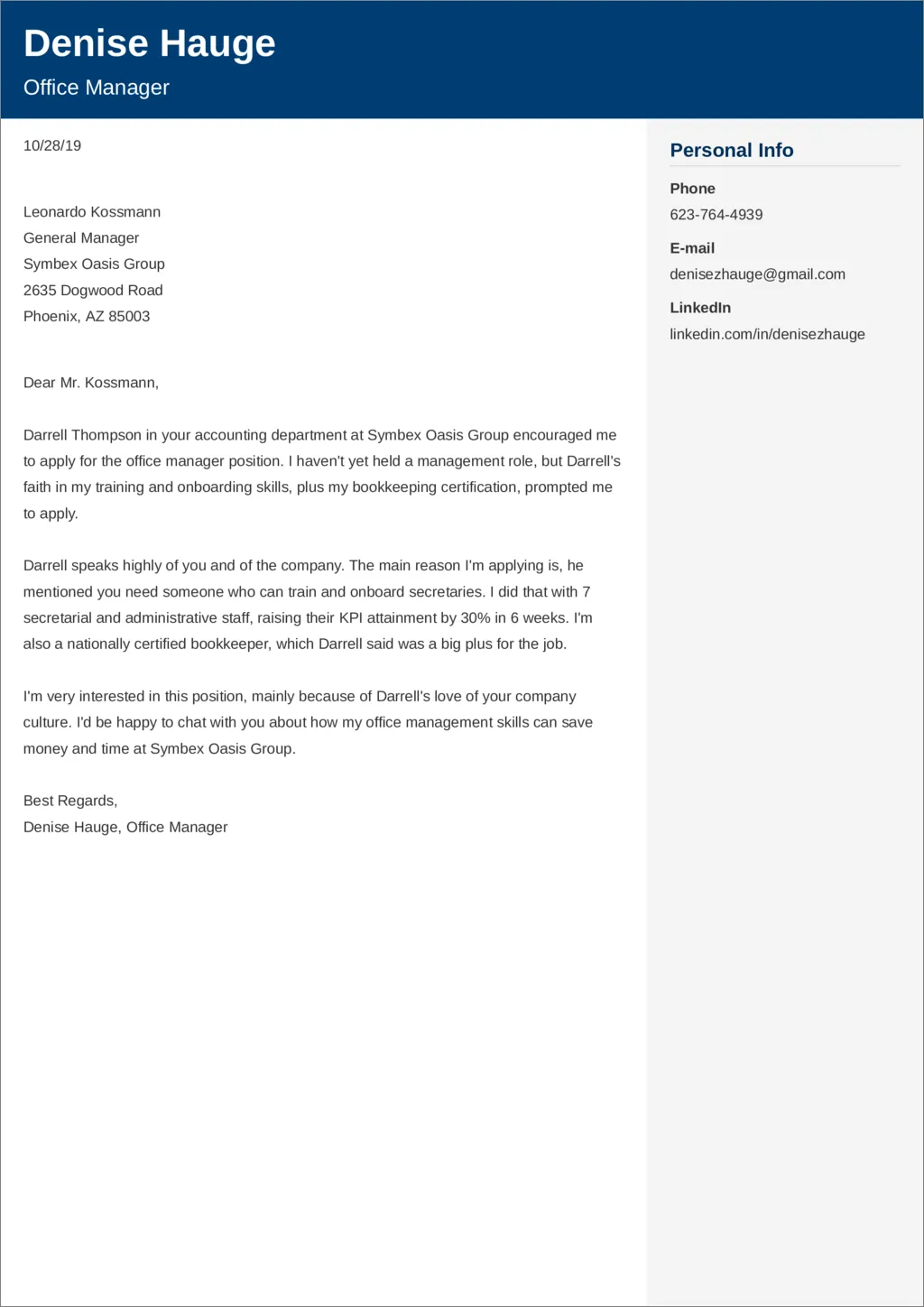
Keywords are important in modern job applications. Many companies use Applicant Tracking Systems (ATS) to scan resumes and cover letters for relevant keywords. Incorporate keywords from the job description into your cover letter to increase your chances of getting noticed. However, be careful not to stuff your cover letter with keywords. Use them naturally within the context of your sentences. Identify the most important keywords and use them strategically to highlight your skills and experience. This increases your chances of passing the ATS scan and getting your application seen by a human.
Proofreading and Final Touches
Before submitting your cover letter, proofread it carefully for any errors. Typos, grammatical errors, and formatting inconsistencies can create a negative impression and undermine your credibility. Take the time to review your cover letter multiple times, checking for any mistakes. Consider having a friend or colleague review it as well, as a fresh pair of eyes can often catch errors you might miss. A polished and error-free cover letter demonstrates your attention to detail and professionalism.
Checking for Grammar and Spelling Errors
Carefully check your cover letter for any grammar and spelling errors. Use a spell checker and grammar checker, but don’t rely on them completely. Read your cover letter aloud to catch any awkward phrasing or sentence structure issues. Pay close attention to punctuation, capitalization, and verb tenses. Ensure that all the information is correct and that the language is clear and concise. A cover letter filled with errors reflects poorly on your writing skills and attention to detail.
Ensuring a Professional Tone
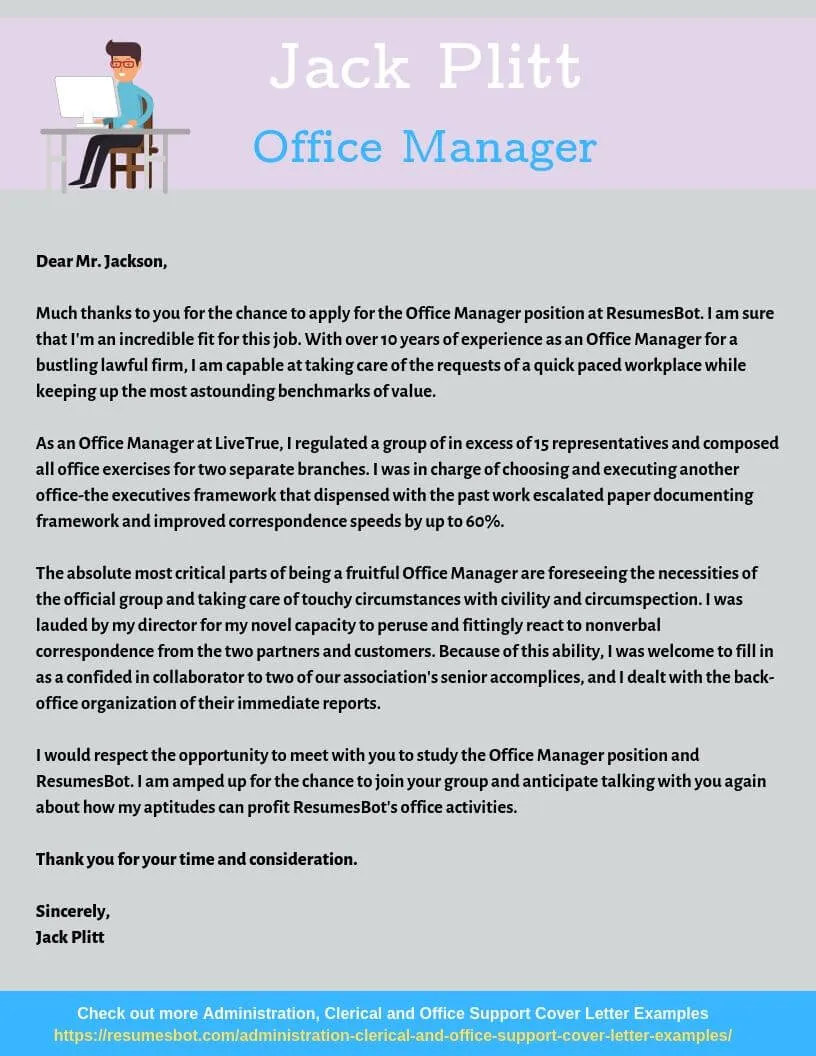
Maintain a professional and respectful tone throughout your cover letter. Avoid slang, colloquialisms, and overly casual language. Use formal language and address the hiring manager appropriately. Be enthusiastic but avoid being overly effusive. Write in a clear, concise, and confident manner. Express your interest in the position and the company without being overly assertive or demanding. The tone of your cover letter sets the stage for how you will perform in an interview, so it should reflect professionalism and respect.
Formatting and Presentation
Pay attention to the formatting and presentation of your cover letter. Use a clean and easy-to-read font, such as Times New Roman, Arial, or Calibri, in a 10- or 12-point size. Use standard one-inch margins. Ensure that your paragraphs are well-spaced and easy to read. Avoid using excessive colors, bolding, or underlining. Make sure your cover letter looks professional and well-organized. A well-formatted cover letter demonstrates your attention to detail and makes it easier for the hiring manager to read and understand.
Best Practices for Cover Letter Writing
Following best practices is key to writing a successful office management cover letter. These best practices include keeping your letter concise, showcasing your enthusiasm, and adding a clear call to action. These simple things can drastically increase your chance of landing the job.
Keeping It Concise and Focused
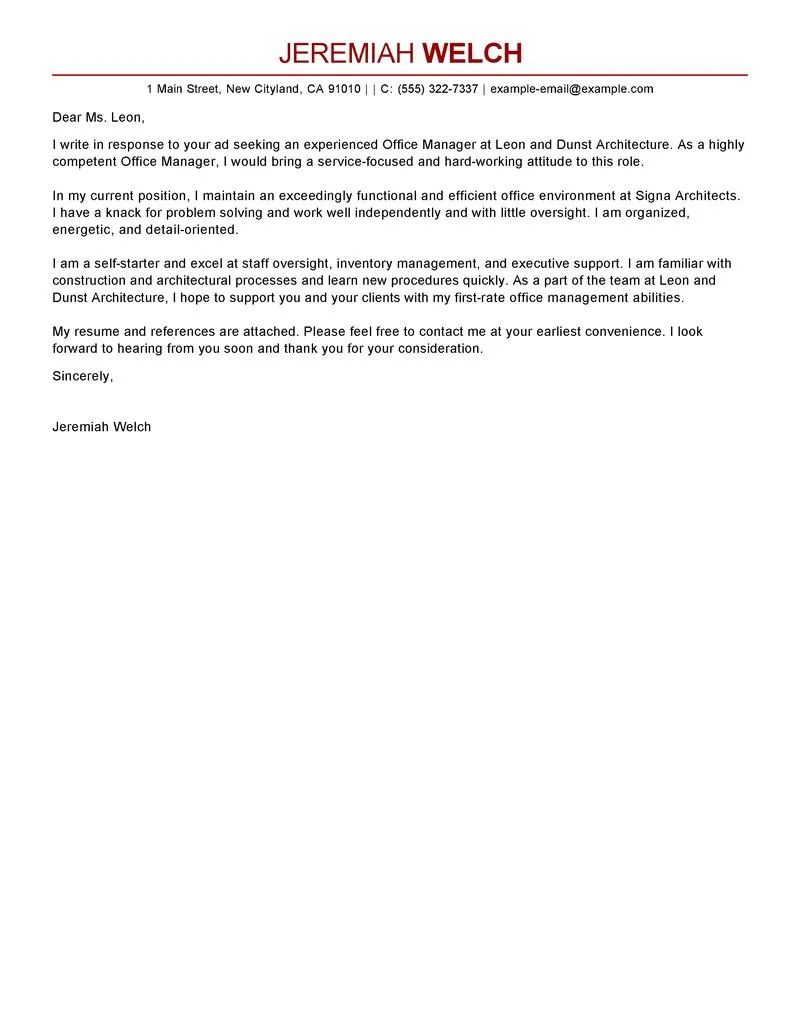
Keep your cover letter concise and to the point. Hiring managers are busy people, and they don’t have time to read lengthy letters. Aim for one page, and focus on the most relevant information. Be sure to highlight your key skills and experiences and avoid irrelevant details. Use clear and concise language, and avoid jargon or overly complex sentence structures. The goal is to convey your message quickly and effectively, capturing the reader’s attention and encouraging them to learn more about you.
Showcasing Enthusiasm and Interest
Demonstrate your enthusiasm for the position and the company. Show that you’ve researched the company and understand its mission and values. Explain why you’re interested in the specific role and how your skills and experience align with the job requirements. Highlight your passion for office management and your desire to contribute to the company’s success. Your enthusiasm can set you apart from other candidates and make a positive impression on the hiring manager.
Adding a Call to Action
End your cover letter with a clear call to action. Let the hiring manager know what you want them to do next. Express your interest in an interview and provide your contact information again. Thank the hiring manager for their time and consideration. Make it easy for them to take the next step. A clear call to action demonstrates your initiative and makes the process easier for the hiring manager.
Common Mistakes to Avoid
There are several common mistakes that can hurt your chances of getting an interview. These include using generic cover letters, focusing solely on your duties, and ignoring the company’s values. Be aware of these pitfalls and make every effort to avoid them in your cover letter.
Generic Cover Letters
Avoid using generic cover letters that can be sent to any company. These letters don’t show your genuine interest in the position or the company. Tailor your cover letter to each job application, highlighting your skills and experience and demonstrating your understanding of the company’s needs. Generic cover letters show a lack of effort and can make it seem like you’re not genuinely interested in the position.
Focusing Solely on Duties
Avoid simply listing your job duties. Instead, focus on your accomplishments and the results you’ve achieved. Provide specific examples of how you’ve excelled in past roles, quantifying your achievements whenever possible. Emphasize the value you can bring to the company, not just the tasks you’ve performed. Highlight your skills and experiences and provide concrete examples of your successes.
Ignoring the Company’s Values
Before submitting your cover letter, research the company and understand its mission, values, and culture. Tailor your letter to reflect these values and demonstrate how your skills and experience align with the company’s goals. Ignoring the company’s values can make it seem like you’re not a good fit for the organization. Showcase your genuine interest in the company and express your enthusiasm for joining the team.
